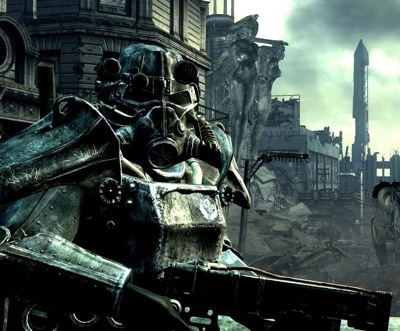In my last post, I covered the early games in the Fallout series, particularly the two RPGs that started it all. Later games branched out in different directions, but it wasn’t until 2008, ten years after Fallout 2, that its true sequel would be released. Bethesda Softworks’ Fallout 3 (for the Xbox360, PS3 and PC) took the gameplay in a very different direction, while remaining true to the feel of the Fallout universe. Building on Bethesda’s previous games, like Elder Scrolls: Oblivion (in my opinion one of the best RPG series ever), Fallout 3 is a first-person roleplaying game. The interface is very similar to first-person shooters, but the game incorporates RPG elements like dialogue, interaction with items, and quests. Additionally, it gives a lot of options in regard to creating your character. A character in Fallout 3 feels more unique than in some other games.
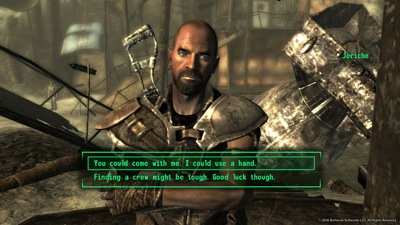
Like previous Fallout games, characters are created in a standard roleplaying manner—putting points into statistics (like Strength and Intelligence) and picking Skills and Perks. Many of these have been carried over from previous games. As you gain levels, you gain more skills and perks. The game also includes what is called the VATS system, where normal real-time combat can be slowed down and you can attack specific points on your opponents’ bodies, mirroring the turn-based, action point combat system of the earlier two games.
The game is set in the same Fallout universe, this time in the greater Washington D.C. metropolitan area. The game contains familiar landmarks such as the Capitol Building, the Jefferson and Lincoln Memorials, the Washington Monument, the White House and a slew of Metro stations. The same 1950s aesthetic is here—in the design of the burned out cars and trucks that litter the empty, broken streets, in the songs, mostly 1940s Big Band numbers from people like the Ink Spots and Billie Holiday, and in the items that litter the landscape—from old-fashioned baby carriages to ham radios.
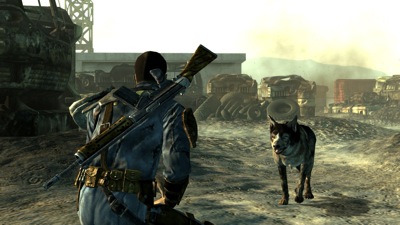
You play yet another Vault Dweller, this time the son of a prominent scientist. Your childhood in the vault is summarized in a tutorial that gives you a hands-on introduction to the game. When your father leaves the Vault, you go after him, leaving the security of the enclosed, underground shelter, for the vast, dangerous openness of the Capitol Wasteland. As you seek your father, and start to unravel the mysteries of his past, you get pulled into larger events which I will not get into for fear of revealing spoilers. The story, to me, is one of the strengths of the game.
It’s amazing the amount of detail they’ve packed into this world (another aspect that will be familiar to those who’ve played the Elder Scroll games). Unlike games that only give you what you need to complete tasks, Fallout 3 is filled with additional information that serves no other purpose than to flesh out the world. Numerous log entries sit on computers and can be accessed to add flavor to the world. The museums of D.C. contain exhibits detailing both real items from our present and fictional items from the game world’s past.
As a longtime Fallout enthusiast (I played the first two games on my first adult PC), Fallout 3 is a chance to be even more immersed in the wonderful Fallout world. The 1st person perspective helps bring the environment more fully to life, and the inclusion of familiar landmarks helps create that quintessential post-apocalyptic dissonant feeling, the same way that the buried Statue of Liberty at the end of Planet of the Apes does.
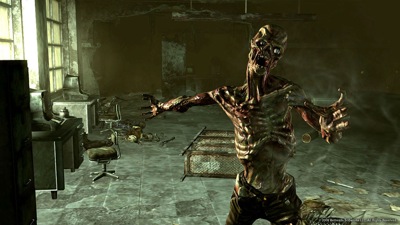
Ditto for the enemies you face. It’s one thing to know you’re fighting a giant mutated cockroach or ant, but to see it in pseudo three-dimensional glory can provoke a visceral response. I still shudder a little when I see the game’s centaurs, hideously mutated creatures.
Radiation, a threat in any post-nuclear war setting, is always an issue, contaminating any open water source (one of the few ways to heal in the game) and most of the food that you’ll come across. Radiation poisoning can be combated with certain medicines or by visiting doctors, or else your health will suffer and you could even develop mutations. Addiction is also possible in the game if you continue to use certain ability-altering drugs.
As with many such games these days, and the previous Fallout RPGs, you can choose how you want to interact with the world and its characters, something that’s tracked with your character’s karma. You can be a complete bastard and lie, betray, steal and kill, you can be a hero and crusader, or anything in between. Generally the benefits come from the extremes. But in such a world, where things are dangerous and broken and people do their best just to get by (there is slavery as well), I find it hard to be anything but the best, most moral character I can be. Taking delight in being evil just seems too wrong. But that might just be me.
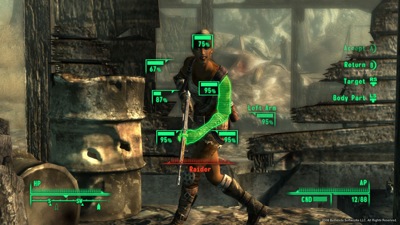
The game is not perfect, I’ll admit. The combat system doesn’t work as well as it could. The kind of real time, button mashing combat that works well in the Elder Scrolls games doesn’t shine with automatic weapons and rocket launchers. To compensate for this, I spend much of my time the game using the VATS turn-based combat system. It’s not a perfect fix (you can’t stay in that mode all the time), but it helps.
Aside from that, though, Fallout 3 is one of the best games I’ve played in recent years. It’s a worthy successor to the previous two Fallout RPGs and an immersive, involving post-apocalyptic game. And if you’re worried about longevity, Bethesda has released not one, but five downloadable expansions (which are also out or forthcoming on disc). PS3 owners might have to wait for some of it, though. These range from okay to really good, and should extend your playing time by weeks if not longer. If you are at all interested in 1st person roleplaying games or post-apocalyptic games, I would check it out.
Rajan Khanna is a graduate of the 2008 Clarion West Writers Workshop and his fiction has appeared in Shimmer Magazine. He lives in Brooklyn with his two cats, Chloe and Muppet.










